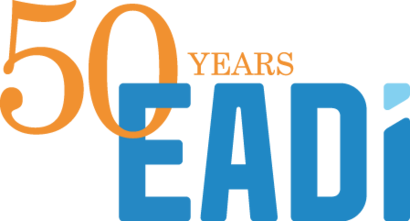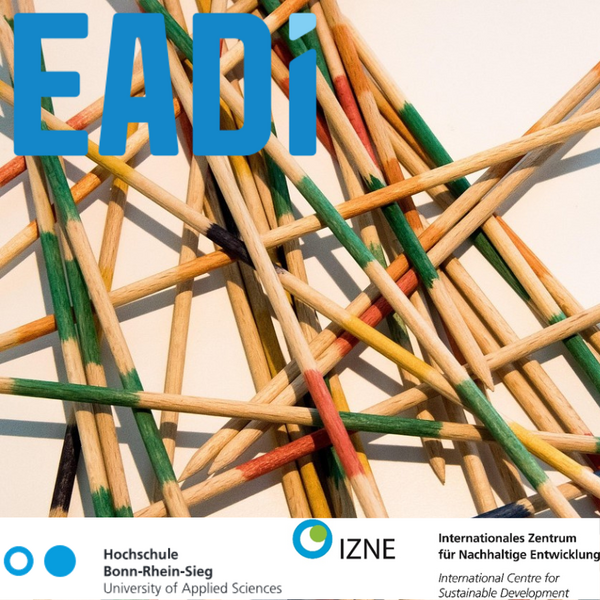Celebrating 50 Years of Commitment to Development Research
EADI is going to celebrate its 50th anniversary from April 2024 to September 2025. EADI was founded 1975 in Linz, Austria, with a preceding assembly of like-minded researchers in 1974 in Ghent, Belgium. They wanted to "promote a concerted approach to the gaps and shortcomings in research on development problems as practised in the rich countries" (The EADI Story, 1999, page 71).
#EADI50
Development in Crisis: Reflecting on the Past, Looking to the Future
EADI was established in the turbulent world of the 1970s. Fast forward fifty years, and the world is equally turbulent. The global South/East and North/West then and now face similar shocks and stressors, although their ability to respond financially, in policy, and in terms of capacity differs dramatically across countries.
Looking backwards, we can note the oil price crisis of the 1970s, the debt crisis and neo-liberal resurgence of the 1980s, the end of the Cold War in 1989, the global financial crisis of the late 2000s, the Arab Spring, and the recent COVID-19 pandemic, among other significant events. We witness a rising number of conflicts within and between countries, most notably the wars in Ukraine and the Middle East and their geopolitical and socio-economic consequences.
Since the 1970s, there have been improvements in a range of basic development indicators, including higher average incomes, reduced infant mortality and child mortality, and wider access to primary education. However, absolute poverty remains pervasive in the global South, and precarity and marginalisation are evident in the North and the South. In much of the North, median wages have stagnated, and poverty has risen, creating new questions for Social Science and potentially, Development Studies in terms of the scope of the field. The post-pandemic context is characterized by higher interest rates and debt servicing leading to austerity measures and the diversion of resources that could otherwise be used for social and productive spending. Across the world, there is the rise of right-wing nationalism and populism. There are also new challenges to democratic ideals, partly linked to digitalisation and new technologies, themselves influenced by geopolitics with states intervening in the elections of other countries.
And on the immediate horizon, climate change is now more evident. Extreme weather events are more frequent, and as agricultural patterns shift with climate change, food production will be volatile. Estimates of migration necessary as a result of climate change are in the order of billions.

How can we understand and respond to these growing incongruences between the need for intensified global cooperation in view of the rising global challenges – climate change, loss of biodiversity, etc. - and the retrograde trend in many countries to look backward to a better past as propagated by populist politicians? What does talk of a “multipolar world” mean? Does it mean a progressive new World Order? And at a national level, is the trend towards increasingly authoritarian/autocratic regimes inevitable or unavoidable?
All of these factors set the context for a series of urgent transitions, including green transitions in energy and adaptation, which will interact with remarkable technological changes, particularly in artificial intelligence, genetic manipulation, and quantum computing in the coming years. It is within this context that the 50th anniversary of EADI takes place.
Dudley Seers, the first President of EADI, stated in his work programme for EADI that "we need to discard the idea that there is such a subject as 'their' problem of development and accept that we are all dealing with common, worldwide problems—though they take different forms in different parts of the world" (The EADI Story 1999, page 91). One could add that the capacity to respond to crises differs not only dramatically between the North/West and South/East but also within the South/East.
During this jubilee year, we aim to critically assess and reflect on development and development studies, responding to the topics raised by our working groups and members over the year, and to today's development challenges.
We intend to generate a kaleidoscope of various views, perhaps rearranging the kaleidoscope to better understand the direction in which the world might be headed. We will have a rolling calendar of events, including local, regional, or international events that fall under the umbrella of the jubilee year.
In summary, as we look ahead, the world today faces multiple crises. We plan to reflect on the past and look forward to assessing what we can expect from the next 50 years and how the world will develop from here.
Under the broad umbrella of reflecting on the past and looking to the future, a set of sub-themes has been identified as follows:
Today’s multipolar world is facing multiple crises. We will discuss how development research, with its interdisciplinary approach and a particular set of concepts and tools, can make a contribution to a deeper understanding of not only crises but also underpinning global challenges such as inequality, climate and biodiversity change. What is the core crisis, and is it one crisis or many? Whose crisis is it? What is the cause, and what is a symptom?
Can it be fixed? Who frames the crisis cause and solutions? Specifically, how can development research respond to the frequent, interconnected, and mutually reinforcing crises the world is facing, and is likely to face in years to come? The events held this year will show how different approaches contribute to our understanding of crises and how to collectively reach sustainable solutions to ensure we leave behind a habitable planet for the next generation.
New global challenges and more diffuse and critical approaches to these need a new skill set. In our jubilee year, we are supporting a research methods summer school, ongoing attention to critical and interdisciplinary pedagogies, and a professional development program to educate development professionals for uncertain futures (for example, looking at how impact can be measured and attributed in uncertain and contingent contexts).
Central to responding to the global crises will be understanding the role of knowledge, science, and policy engagement in creating impact. We work at the Research-Practice nexus to co-produce the knowledge we want to inform evidence-based policymaking. We look critically at what is counted as science, and at the role of science in the political discourse in the context of rising populism and rejection of expertise.
We have a history of European development studies, but this is not a single story – what is the understanding of development (studies) in the European peripheries? What can we learn from this for the future of development studies? What might we lose in moving from development studies to global studies, and can we leave our problematic history behind by doing so? Does development require the socio-economic transformation of societies, or what other models can be drawn upon? Is development universal to all countries, or are there fundamental differences between countries as a result of history?
We will also look at the contested nature of development and development studies; here we explicitly apply an anti-racist and decolonial lens to our practice. In doing so, we raise awareness of the challenges and complexities inherent in development research and practice, for example, by highlighting the histories of, and social construction of research methods such as surveys, or institutions such as universities, and create space for alternative ways of thinking about and doing research and development.
Central to decolonising knowledge is promoting equity in research and university partnerships through dialogue with funders as well as our members. To achieve this, we work alongside global development and social studies networks, for example, in creating joint events and guidelines. We encourage regional cooperation between EADI members, including during our Jubilee year, and extend this to the next generation of researchers via our regional ECR workshops. The goal of this is to ensure that whatever their origin, ideas about new forms of human well-being become part of the development mainstream, alongside alternative technologies, and frugal innovation?
In sum, development remains turbulent. The challenge is global, even if the ability to respond is still largely national and highly differentiated across countries. What can Development Studies contribute to solving the problems of the world: Inequality, poverty, climate and biodiversity change, migration, food security, energy, conflicts, (human) security, development cooperation and policy, power imbalances, social protection, decent work?
The events of our jubilee year will facilitate discussions/workshops/lectures to explore such questions.
EADI Jubilee Event 2025, 22-23 May
Supported by

EADI History: Timeline
Discover EADI's history here!
#EADI50 Opening Panel in Madrid
Development Studies and Policy Engagement: Building the Missing Link?
Preparatory Group
Katja Bender, IZNE
Basile Boulay, EADI
Laura Camfield, University of East Anglia
Susanne von Itter, EADI
Nita Mishra, University of Limerick
Maria Sassi, University of Pavia
Andy Sumner, King's College London
Jürgen Wiemann, former EADI Vice-President




 Upcoming Events
Upcoming Events


